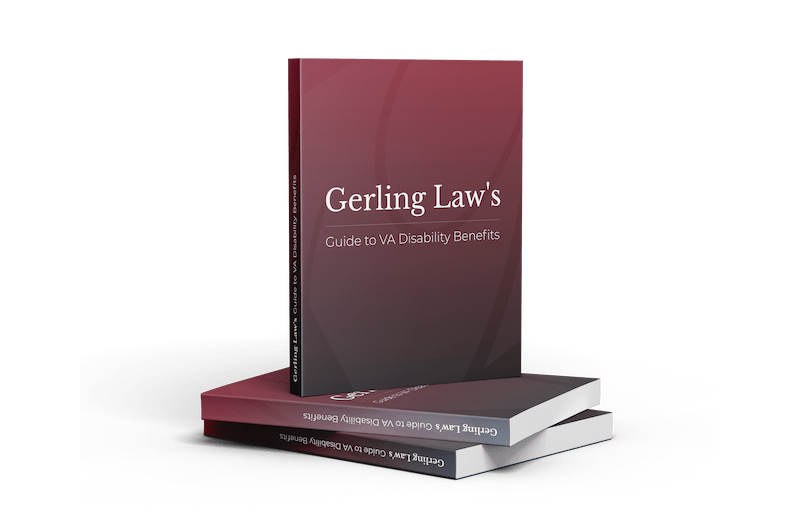Total Disability based on Individually Unemployable (TDIU) benefits is essential for service members injured while on duty or who suffer from a service-connected disability. Your status as an injured veteran entitles you to these benefits if you cannot work. However, the Veterans Affairs (VA) might not be on your side and may fight against you.
You’ve served heroically and you should receive your TDIU benefits for your service-connected disability permanently. At Gerling Law, our nationwide veterans’ disability lawyers are ready to help you get the disability pay you deserve—for the rest of your life. We vow to be with you and your family every step of the way. Why? Because you fought for us, so now we are honored to fight for you.
What Is TDIU?
The VA will compensate you for your service-connected disability if you can no longer work. The VA refers to this benefit as TDIU. This is an important program for many veterans with service-connected disabilities that fall short of a 100% total permanent disability rating by the VA.
A rating of 100% disability means that the veteran has one or more total and permanent disabilities related to their military service. However, it is important to note that a veteran who qualifies for TDIU can receive 100% disability benefits even though they do not have a 100% disability rating.
Also, TDIU benefits are permanent unless the VA rules that there is a chance your condition may improve. You will know if the VA believes you are permanently disabled if they indicate that they do not plan to ask you to submit to a status exam. However, if the benefits you receive from the VA contain language that they will schedule future exams, then the VA has ruled you are not totally and permanently disabled. Of course, the VA can choose to bring you in at any time for an exam when you are on TDIU benefits.
Making Your TDIU Benefits Permanent
You have the right to ask the VA to make your TDIU benefits permanent. First, you should submit an updated VA Employment Questionnaire annually. You should do this even if the VA does not send you a reminder each year. Failing to do so could cause the VA to reduce your disability rating.
Secondly, writing a letter to your regional VA office requesting a permanent disability rating is appropriate. Your TDIU lawyer from Gerling Law will write this for you. They will assemble the necessary medical records and doctors’ opinions about your permanent disability and advocate for you.
What Benefits Are Available Under TDIU?
Under the TDIU program, you will receive health care and financial compensation. As a veteran, you receive all of your healthcare through the VA. However, your spouse and children are eligible for ChampVA healthcare benefits. You and your family might also be eligible for additional benefits such as schooling and housing.
Who Is Eligible for TDIU?
Under the VA’s TDIU benefits program, you may be eligible for disability benefits if:
- You have one service-connected disability rated by the VA of at least 60% disability, or
- You have two or more service-connected disabilities and one of those is at least 40% disabling and your total disability is at least 70%.
However, the VA will not give you TDIU benefits unless you show that you cannot keep a job the VA calls “substantially gainful employment.”
What Is Substantially Gainful Employment According to the VA?
The VA considers substantially gainful employment as work that a non-disabled person would take to earn a livelihood. That means the employment provides earnings that are commonplace in the community where the veteran lives. Since the standard of living changes regionally, the meaning of substantially gainful employment is not uniform across the country. Notwithstanding, the VA could use the federal poverty level as the basis for defining substantially gainful employment. In 2021, the federal poverty threshold is $12,880 for someone living alone. That’s not a lot of money at all.
The VA might not take your word that you are unemployable—meaning that the job that you have or any job you could get meets the definition of substantially gainful employment.
The VA will examine several factors to determine if you are unemployable. Those factors are:
- Inability to perform household duties without substantial help;
- Evidence of progression of disabling conditions, coupled with age;
- Reaching mandatory or optional retirement age and whether attaining that age might prevent the veteran from finding other work; and
- Cognitive, character, or behavioral disorders that render the veteran unemployable.
You should note that losing a job because you were sent to jail for a crime caused by a mental or emotional disorder does not qualify you as unemployable.
Working and Getting TDIU
If you work but make less than the federal poverty threshold, then the VA might consider you to have “marginal employment.” The VA will allow you to keep a job they classify as marginal employment and give you full benefits. Also, if you work in a protected environment, then you can keep your benefits.
Working in a protected environment means working at a family business or having employment with special accommodations. Essentially, a protected environment means you work at a job you cannot get fired from. The VA will give you your TDIU benefits even if your income is greater than the federal poverty threshold if you work in a protected environment.
Applying for TDIU Benefits
The VA allows you to file for TDIU through their online portal, in person, or by mail. You have one year to complete your application once you start it. The VA will deny your application if you started it online but do not file it within 365 days.
Although the VA says you do not need to file supporting documents, they recommend that you file as much evidence as you can to support your claim. This will decrease processing time.
There is another reason why you should present as much evidence as possible with your application. Without supporting documents, the VA will schedule exams to determine your disability rating. However, your application is stronger if you have doctors’ notes with medical and treatment records that substantiate your claim.
The VA also requires you to file:
- Your DD-214 or other discharge paperwork;
- A Veteran’s Application for Increased Compensation Based on Unemployability (VA Form 21-8940); and
- A Request for Employment Information in Connection with Claim for Disability Benefits (VA Form 21-4192).
Get the Help You Need From Veterans’ Lawyers You Can Trust
Perhaps you grew accustomed to the bureaucracy of the military while serving. However, now that you are separated from the military, dealing with the bureaucracy on your own can be difficult. And dealing with the VA gets even harder when you are disabled and desperately struggling to make it financially.
You do not have to take on the VA alone. At Gerling Law, our veterans’ benefits attorneys have extensive experience helping disabled veterans get the benefits they so richly deserve. Contact us at 866-311-2894 and let’s talk today about your TDIU claim. Our conversations are always confidential and our consultations are free.
Go with Experience. Go with Gerling. ®

